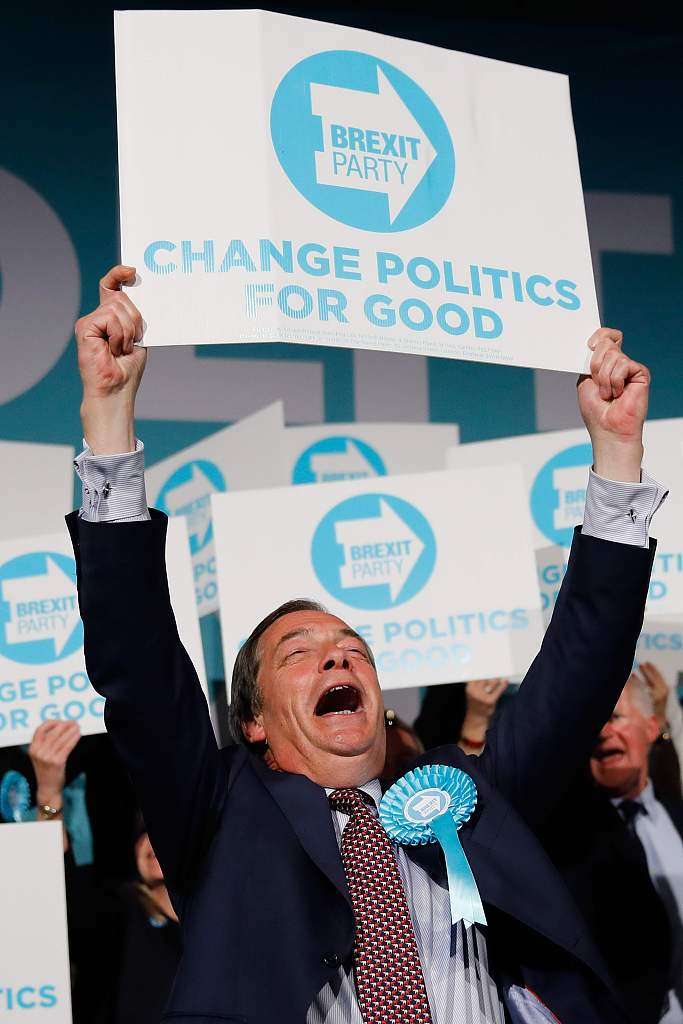
Opinion
11:25, 24-May-2019
Where is European politics heading?
Updated
16:15, 24-May-2019
Pieter Cleppe

Editor's note: Pieter Cleppe represents the independent UK think tank Open Europe in Brussels. The article reflects the author's opinion, and not necessarily the views of CGTN.
This week, European Parliament elections are being held. It is the 9th parliamentary election since the first direct elections in 1979.
Many will be curious to see how the turnout will evolve, which has been decreasing at every single EP election.
Since the last European Parliament vote in 2014, the EU has been confronted with a range of crises. In 2015, there was yet another episode of the Eurozone crisis, with Greece almost leaving the Eurozone, which may have led to a full breakup of the monetary union. Then there was the migration crisis, with 2.5 million migrants crossing EU borders illegally in 2015, 2016 and 2017. This stabilized as a result of increased border checks in the Balkan countries, the EU-Turkey deal and stricter Italian policies.
In 2014, when the last EP elections took place, around one in four Members of the European Parliament could be broadly defined as "eurosceptic." According to seat projections, based on opinion polls, this would now increase to around one in three.

Election officer checks details of a citizen before voting at a polling station for the European Parliament elections at the Kurhaus in Scheveningen, the Netherlands, May 23, 2019. /VCG Photo
Election officer checks details of a citizen before voting at a polling station for the European Parliament elections at the Kurhaus in Scheveningen, the Netherlands, May 23, 2019. /VCG Photo
There really are two kinds of "eurosceptics." First, there are those trying to reform the EU into a more modest intergovernmental arrangement, focused on scrapping barriers to trade among countries. Second, there are those trying to rip up everything and resurrect border checks and economic protectionism.
Therefore, the EU should no longer ignore constructive criticism and it should stop trying to transfer more powers and money to the EU level. Only in the last year, the EU Commission proposed to scrap national vetoes over taxation and over foreign policy, the two sensitive policy areas are closely linked to the heart of national democracy.
In the UK, many are angry that the country still hasn't left the EU, now almost three years after the referendum, whereby a majority of the public voted for Brexit. The so-called "Brexit Party" is expected to become the single largest political party in the European Parliament, while opinion polls have estimated it may well convince 37 percent of the public. Meanwhile, the ruling Conservative Party is polling as low as seven percent.
The governing Conservatives fear that the success of the Brexit Party in the EP elections may well be replicated in national elections. Those could take place in case a new British prime minister would risk a "no deal" scenario in negotiations with the EU.
Many in the ruling Conservative Party are wary of such a "no deal," given the damage it would do to the economy and to overall good relations with mainland Europe. To be fair, those arguing for "no deal," mainly want to negotiate, as the Brexit Party has for example stated that it wants to be involved in "no deal" negotiations.

Brexit Party leader Nigel Farage holds up a placard along with other candidates at the end of a European Parliament election campaign rally in London, May 21, 2019. /VCG Photo
Brexit Party leader Nigel Farage holds up a placard along with other candidates at the end of a European Parliament election campaign rally in London, May 21, 2019. /VCG Photo
In Germany, the eurosceptic AfD is poised to convince at least 10 percent of the electorate, thereby consolidating itself further as a force in German politics. It emerged after German Chancellor Angela Merkel's center-right CDU formation agreed to Eurozone bailouts, which was a breach of the vow to German voters that giving up the national currency would never mean having to pay for transfers to other countries.
The party's popularity was boosted as a result of the chaotic migration inflow but it has since lost some support, as the migration crisis has faded.
It's unlikely that eurosceptics will be able to insert a lot of influence in the European Parliament, as they still only command a minority.
Indirectly, however, their success is changing the debate and the legitimacy of the EU.
According to a Dutch poll, 47 percent of Dutch voters are dissatisfied with the EU, while only 32 percent is satisfied. However, 72 percent still support EU membership.
The picture is similar all across Europe. It would be wise for the EU not to take comfort in the high numbers of support for EU membership. If the EU continues with business as usual, ignoring those proposing that it becomes more modest and focuses on scrapping barriers to trade, it will fuel the popularity of those keen to throw away the baby with the bathwater.
(If you want to contribute and have specific expertise, please contact us at opinions@cgtn.com.)

SITEMAP
Copyright © 2018 CGTN. Beijing ICP prepared NO.16065310-3
Copyright © 2018 CGTN. Beijing ICP prepared NO.16065310-3